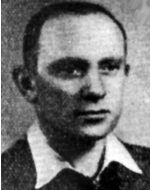Kohl, Mundek (Joachim)
He was born in the city of Ternopol in eastern Galicia to a devout family in the city of Ternopol, where he was 13 years old and rebelled against the rule of his parents’ home and joined the Hashomer Hatzair youth movement, but remained very attached to his mother, In the course of his regular service in the Polish army, he was sent to the officers’ school, specialized in the use of heavy machine guns and had a rank in the army, and after his discharge he joined the movement’s training and was, by nature, , As evidenced by his fellow training, his work was felt in strengthening the spirit of pampered gymnasts to suffer the suffering of pioneers, whose material existence After the Russians entered Ternopol, he worked at a large printing factory, adapted himself to life under the new regime, and, as a result, , But he also found fault with him, was recognized as a dedicated and talented worker and was offered to participate in the administration, and he refused to ask for a way to immigrate to Eretz Israel. In the war against the Germans he was drafted into the Red Army and sent to the officers’ school. He participated in many battles, including the great battle of Stalingrad. After the war he remained in Tashkent, and when Polish citizens were allowed to return to their country, he gave up his chances of progress and returned to Poland to finally reach his friends who had immigrated to Israel. In the meantime, he devoted himself to redeeming the children of She’erith Hapleitah from monasteries and private places and transferring them to a Jewish orphanage that had been set up in a German estate in Silesia and made great progress in running the institution and educating the children. Because of this vital work, the movement center again delayed its rise. He was finally allowed to board and join his friends at Yad Mordechai in March 1948, during the War of Independence. By sheer force of will, he overcame the weakness of his body, so that he would not be barred from casting work in the building, and then transferred to work in the cowshed. The defense needs cut him off from the quiet work. As a veteran fighter with knowledge and experience, he tried to bestow his ability on his comrades, using both heavy machine guns and fortifications. And once also participated successfully in harassing Arab transport to Gaza. As an expert he was well aware of the desperate situation of the place, but believed in the miracle of a Jewish effort to allow the impossible. At the beginning of the Egyptian invasion, he managed to hit a machine gun that was operating in an enemy plane, and from the position of the attack on the advancing infantry. At the time of the big bombing, he told his friends that such a firepower was known only near Stalingrad, but there too he had not seen such a wonder of how many poorly equipped and heavily armed people stood up and were well equipped. Shortly after his remark, on May 19, 1948, he was killed by a shell in the head and brought to eternal rest in the cemetery in Yad Mordechai.
